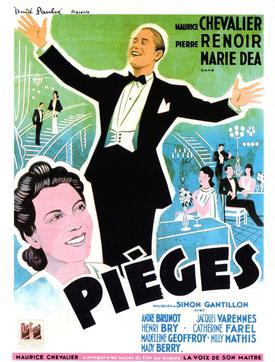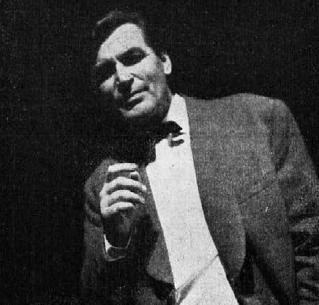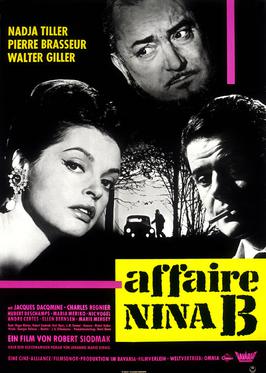
Robert Siodmak was a German film director who also worked in the United States. He is best remembered as a thriller specialist and for a series of films noir he made in the 1940s, such as The Killers (1946).

The Dark Mirror is a 1946 American film noir psychological thriller film directed by Robert Siodmak starring Olivia de Havilland as twins and Lew Ayres as their psychiatrist. The film marks Ayres' return to motion pictures following his conscientious objection to service in World War II. De Havilland had begun to experiment with method acting at the time and insisted that everyone in the cast meet with a psychiatrist. The film anticipates producer/screenwriter Nunnally Johnson's psycho-docu-drama The Three Faces of Eve (1957). Vladimir Pozner's original story on which the film is based was nominated for an Academy Award.

Ruth Leuwerik was a German film actress, one of the most popular stars of German film during the 1950s. She appeared in 34 films between 1950 and 1977. Leuwerik is probably best known for her portrayal of Maria von Trapp in the films The Trapp Family and The Trapp Family in America.

Mollenard is a 1938 French drama film directed by Robert Siodmak and starring Harry Baur, Gabrielle Dorziat and Pierre Renoir. It was also known by the alternative titles of Hatred and Capitaine Corsaire. The film's sets were designed by Alexandre Trauner. It is based on the novel of the same name by the Belgian writer Oscar-Paul Gilbert. The film's plot divides sharply into halves, with the first an action thriller set in China while the second is a social drama with the title character struggling to cope with what he regards as the suffocating atmosphere of his home port in France.
Alfred Schieske was a German actor.

Genia Nikolajewa (1904–2001) was a Russian-born German actress who made films in several countries, notably in Germany where she appeared in films such as Robert Siodmak's 1932 comedy Quick in a succession of supporting or minor roles. She later moved to Hollywood. She was sometimes credited as Genia Nikolaieva or Eugenia Nikolajewa.

The Burning Secret is a 1933 Austrian-German drama film directed by Robert Siodmak and starring Alfred Abel, Hilde Wagener and Hans Joachim Schaufuß. It was based on the 1913 novella of the same title by Stefan Zweig. It was released by the German branch of Universal Pictures. It was shot at the EFA Studios in Berlin and on location around Ascona in Switzerland. The film's sets were designed by the art director Robert A. Dietrich.

Goodbye, Franziska is a 1957 West German romance film directed by Wolfgang Liebeneiner and starring Ruth Leuwerik, Carlos Thompson and Josef Meinrad. It is a remake of the 1941 film of the same name. It was shot at the Spandau Studios in Berlin. The film's sets were designed by the art directors Gottfried Will and Rolf Zehetbauer.

Personal Column is a 1939 French thriller film directed by Robert Siodmak and starring Maurice Chevalier, Pierre Renoir, Marie Déa and Erich von Stroheim. It was shot at the Joinville Studios in Paris. The film's sets were designed by the art directors Maurice Colasson and Georges Wakhévitch. Lured, an American re-make, directed by Douglas Sirk and starring Lucille Ball, was released in 1947.

Time Out of Mind is a 1947 American film noir drama film directed by Robert Siodmak and starring Phyllis Calvert, Robert Hutton and Ella Raines. Made by Universal Pictures on a large budget of $1,674,500, the film was not a commercial success. The British actress Calvert was a major star in Britain and other countries for her roles in the Gainsborough Melodramas.

The Night Before the Divorce is a 1942 American comedy film directed by Robert Siodmak and starring Lynn Bari, Mary Beth Hughes and Joseph Allen, adapted from the 1937 play of the same name by Gina Kaus and Ladislas Fodor.

Bert Sotlar was a Yugoslav film actor. He starred in the 1959 German film Dorothea Angermann.

My Schoolfriend is a 1960 German comedy drama film directed by Robert Siodmak and starring Heinz Rühmann, Loni von Friedl, and Hertha Feiler. It is based on the play Der Schulfreund by Johannes Mario Simmel.
Siegfried Franz (1913–1998) was a German composer of film and television scores.
Alfred Beierle was a German stage and film actor.

An Alibi for Death is a 1963 Austrian-German crime drama film directed by Alfred Vohrer and starring Ruth Leuwerik, Peter van Eyck and Charles Regnier.

About an Inquest is a 1931 German crime film directed by Henri Chomette and Robert Siodmak and starring Annabella, Jean Périer and Colette Darfeuil. It was produced by UFA, as the French-language version of the studio's film Inquest. Such multiple-language versions were common in the early years of sound before dubbing became widespread.
Robert Stratil was a German art director. Born in Ostrava of Sudeten German heritage, he fled Czechoslovakia following World War II and settled in Munich where he worked at the Bavaria Studios.

My Father, the Actor is a 1956 West German drama film directed by Robert Siodmak and starring O.W. Fischer, Hilde Krahl and Susanne von Almassy. The film's sets were designed by the art directors Otto Erdmann and Wilhelm Vorwerg. It was shot at the Spandau Studios and on location in West Berlin. It premiered at the Marmorhaus in the city.

The Nina B. Affair is a 1961 French-West German drama film directed by Robert Siodmak and starring Nadja Tiller, Pierre Brasseur and Walter Giller.
















